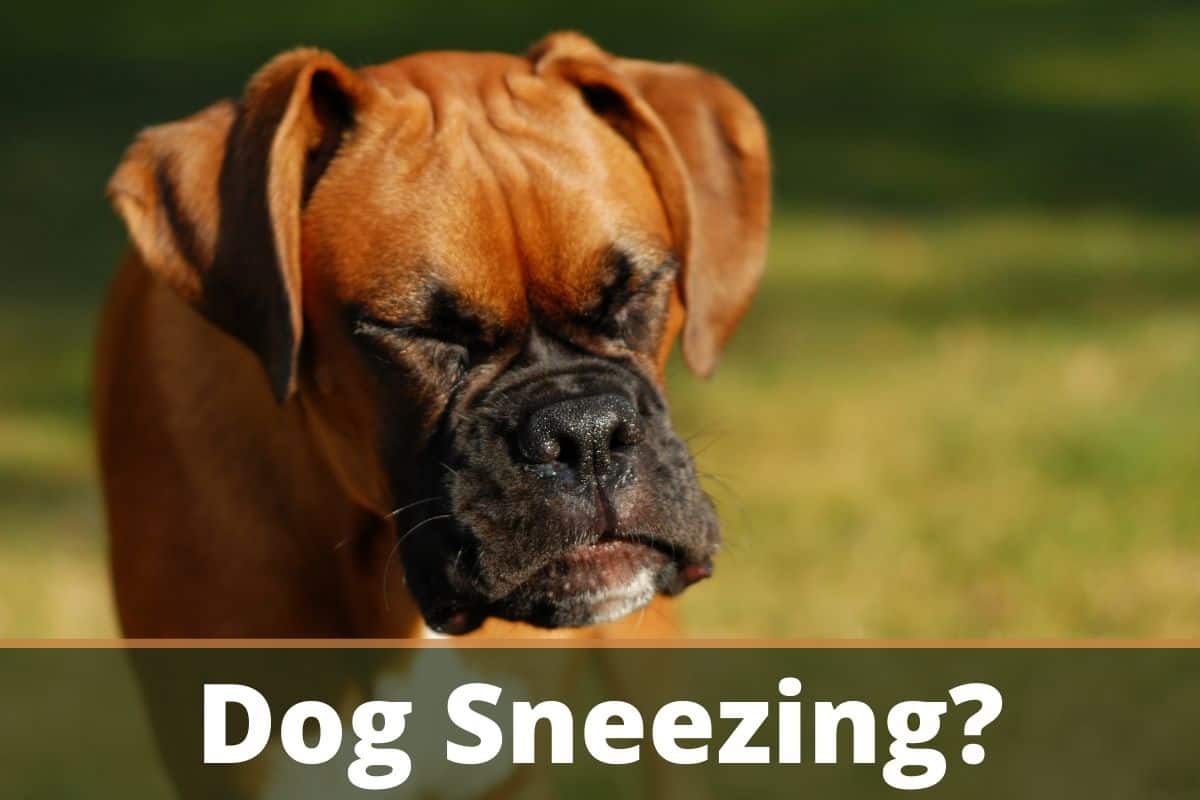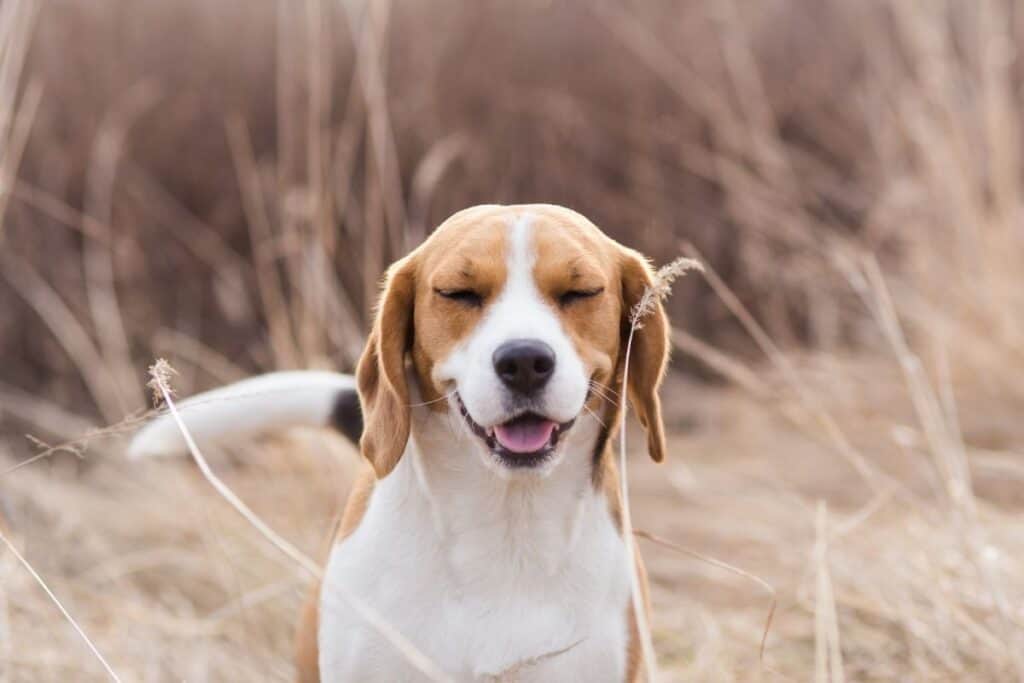
Dogs can sneeze for many reasons. Being a dog owner can sometimes make it challenging to discern if your dog’s sneezing is a reason to draw concern. What causes a dog to sneeze?
The top causes for dog sneezing include allergies, reverse sneezing caused by overexcitement or stress, and an act of normal dog communication to “talk” to other dogs. Some of these reasons are normal dog behaviors, while others can lead to more severe diseases that would require you to see your vet.
If your dog is constantly sneezing, you need to figure out why and consider trying some of these at-home remedies to help.
Most common reasons for dog sneezing
These are 4 of the most common reasons that your dog may be sneezing a lot!
1. Allergies
Allergies are a hypersensitive response to foreign objects by your dog’s immune system, which both people and pets can suffer from each day. Dogs suffer from quite a few different types of allergies.
Skin allergies, food allergies, and environmental allergens can cause your dog a lot of issues that need to constantly be treated and managed.
Many of these symptoms from these different types of allergies can overlap, making it harder for you to determine what is actually causing the underlying issue.
2. Upper Respiratory Infection
If your dog is sneezing green mucus, this may be an upper respiratory infection. Many times, these dogs will also not eat, become lethargic, or cough.
If your dog has an upper respiratory infection, your dog will need to see your vet for x-rays and antibiotics to make sure that they are not developing pneumonia.
3. Reverse Sneeze
It’s important to discern between sneezing and reverse sneezing. A reverse sneeze is usually caused by irritation to the throat or the sinuses that create spasms.
The dog takes loud, involuntary breaths to clear the irritation or the sinus passages, and it sounds like the air intake that happens at the beginning of a normal sneeze, sometimes even like a loud honking noise.
You may consider getting your dog’s sinuses evaluated by your veterinary professional to rule out a medical condition, such as collapsing trachea, a sinus infection, or a tumor, as the cause.
4. Communication
Some dogs will use their sneezes as a way of communication with humans and even other animals.
Sneezing is just one way that your dog can communicate, just like your dog’s body language or facial expressions.
A dog can compulsively sneeze when playing to release their energy, frustration, or nervousness. dogs have also been known to fake sneeze as a way to get attention from their owner.
Often a dog will watch you as they fake sneeze to see if you’ve noticed them. They may even move close to you and sneeze so that you cannot ignore them.

What to do if your dog keeps sneezing?
If your dog is sneezing, these are some things that you can do at home to help
#1 Over the counter medications
You can start treating sneezing with over-the-counter drugs like:
- Benadryl (diphenhydramine)
- Zyrtec (Cetirizine)
- Claritin (loratadine)
These are easily obtained at most general stores and all pharmacies. Benadryl can be administered every four to six hours at 25mg/pound.
Both Zyrtec and Claritin come in 10mg tablets and can be given once daily. The dose is given by your veterinarian based on the size of your pet.
#2 Call in the big guns!
A veterinarian may need to be called in to prescribe medication for really tough sneezing cases.
Common medications that your vet may prescribe to help your dog’s sneezing are:
- Hydroxyzine
- Temaril-P
- Apoquel or
- Cytopoint
These are all prescription medications that are used for allergy relief safely in animals.
Steroids are another type of medication often used by veterinarians to help dry up sinuses and stop the process of irritation causing sneezing and other respiratory issues.
These drugs should not be used in animals with known hypersensitivity or allergy to the drug.
What can my vet do for my dog who is sneezing?
Before starting any drug regimen, a full CBC and Chemistry blood panel should be run by your veterinarian. Annual or every 6 months, blood work is recommended for all dogs.
There are four main types of testing that your veterinarian may recommend for your dog:
- Complete Blood Count: A CBC will check the red blood cell, white blood cell, and platelet counts. It provides details about the number, size, and shape of the various cell types and identifies the presence of any abnormal cells.
- Biochemistry profile: A biochemistry profile is a panel of tests that provides information about the liver and kidney functions and other organs and tissues of the body. It helps to detect diabetes, kidney disease, liver disease, and other disorders.
- Urinalysis: A urinalysis is part of a complete assessment of the kidneys and urinary system and should be included in routine wellness testing.
Urinalysis will give your vet information on how your dog’s kidneys are working and help see if there is any inflammation and infection in your dog’s urinary system. This can also help see if your dog has diabetes and can be useful in diagnosing cancer within the urinary system.
- Thyroid levels: A thyroid test checks the thyroid gland, which acts as the body’s thermostat and sets the metabolic rate. Dogs are prone to hypothyroidism which occurs when the thyroid gland fails to produce enough thyroid hormone.
Hormone levels should be tested routinely, especially if any weight gain is noticed or your dog becomes more lethargic or develops hair loss of the body or tail.
Your veterinarian will help you determine the best medication for your pet based on age, lifestyle, and severity of the sneezing.
Talk to your vet if you have any questions or concerns about whether or not your dog needs medication like this.
When should I be concerned about my dog sneezing?
A dog views the world mostly through its sense of scent. It is not uncommon to see a dog sniffing the air or keeping its nose to the ground.
These are sometimes when your dog sneezing can be a concern!
1. If they inhaled a foreign object
The potential that your dog might inhale a foreign object and get it stuck in their nasal cavity is uncommon but does exist.
Having inhaled a foreign object will cause a dog to sneeze uncontrollably in an attempt to dislodge the object.
If you ever think your dog may have inhaled something, it should be seen by a veterinary professional as soon as possible.
This does not occur very often, but it’s important to take any potential airway blocking as a serious matter.
2. There is a mass in their nose
Nasal tumors are another concern if your pet has an ongoing sneeze that worsens with time. If a tumor is present, the larger it grows, the more likely the dog sneezes. Your dog may develop other upper respiratory issues as well.
A veterinary examination will determine if you are dealing with a tumor or something more benign. Your vet will help you to determine the best course of action for a dog with a nasal tumor.
These tumors can often be removed; sometimes, they require chemotherapy or other forms of treatment to help them shrink.
What to do when your dog doesn’t stop sneezing
If your dog continues to sneeze and does not stop, it might be a sign that there is something more severe going on.
These are some other signs and symptoms that your dog sneezing may be more serious than just allergies:
- Goose honking sound when they sneeze
- Trouble breathing
- Lack of appetite
- Lethargic
- Bluish colored gums
- Fever
- Excessive discharge from eyes or nose
If any of these signs are seen in association with severe sneezing, contact your veterinarian for an appointment to ensure that your pet doesn’t have a bigger problem that needs to be addressed.
What are some home remedies for sneezing dogs?
There are just a few at-home remedies you can try to stop your dog’s sneezing if you think that it is getting out of hand:
- Increasing the humidity in your house: You can add a humidifier near where your dog sleeps. This can help cut down on a dry environment that can often irritate your dog’s nose.
- Add an anti-inflammatory supplement to your dog’s diet: You can give your dog an immune-boosting supplement that can help alleviate your dog from any irritants that can cause inflammation in your dog’s nose.
- Flush your dog’s nasal passages: You can use saline drops in your dog’s nose to help clear out their nose to flush any obstructions, irritants, or allergens. You can also use a neti pot to help facilitate this nasal flushing if your dog is still enough.
If these at-home treatments do not work or the sneezing is getting worse, it is best to see your vet.
Final thoughts on dog sneezing
Sneezing can be irritating and knowing why your dog is sneezing is important for their care. Once you know all about sneezing in your dog, you will be able to assess whether your dog will need to see your vet or just needs some time to react to an irritant naturally.
If your dog’s sneezing also occurs along with other symptoms, then you will want to call your vet to possibly rule out a more severe problem.
There are many causes for dog sneezing and many treatment options as well; your vet can be a great source of information to help you determine if your dog’s sneezing is serious!
